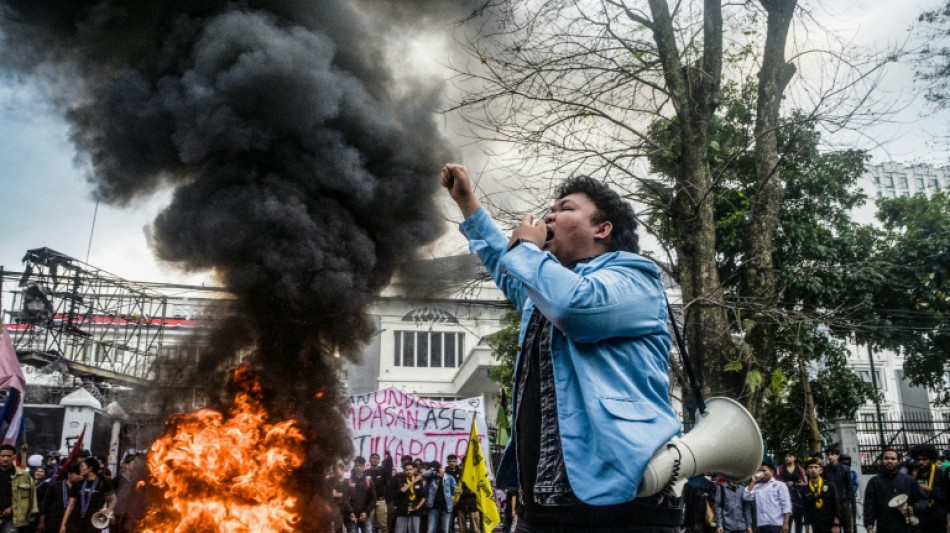

Indonesia leader in damage control, installs loyalists after protests
In removing Indonesia's finance minister and U-turning on protester demands, the leader of Southeast Asia's biggest economy is scrambling to restore public trust while seizing a chance to install loyalists after deadly riots last month, experts say.
Demonstrations that were sparked by low wages, unemployment and anger over lawmakers' lavish perks grew after footage spread of a paramilitary police vehicle running over a delivery motorcycle driver.
The ensuing riots, which rights groups say left at least 10 dead and hundreds detained, were the biggest of Prabowo Subianto's presidency and the ex-general is now calling on the public to restore their confidence in his government.
He vowed tough action on the officers who ran over 21-year-old Affan Kurniawan, backtracked on lawmaker housing allowances, and on Monday removed five ministers, including respected finance minister Sri Mulyani Indrawati.
"We can read this as damage control after the wave of public anger, especially at... the misdirected budget efficiency," Rani Septyarini, a researcher at the Center of Economic and Law Studies, told AFP.
Prabowo has focused on expensive social mega-projects funded by widespread budget cuts that already roused protests in February. His flagship policies include a free meal programme and a new sovereign wealth fund.
But his new finance chief Purbaya Yudhi Sadewa said Wednesday he would inject an unprecedented $12 billion into the economy to spur growth and calm simmering public anger.
"Prabowo sees this problem as something that needs to be anticipated seriously," said Airlangga Pribadi Kusman, political analyst at Airlangga University.
"He wants to prevent further social damage."
- Consolidating power -
Prabowo surged to victory in last year's election and maintained a high approval rating of more than 80 percent 100 days after entering office in October, according to polls.
But the protests turned increasingly angry against the country's political elite, with mobs burning buildings and looting politicians' homes.
"This shows that the public has a real, legitimate problem with this administration," said Airlangga.
Yet the Indonesian leader has used the reshuffle to replace officials linked to popular predecessor Joko Widodo, more commonly known as Jokowi, with his own people.
Sri Mulyani served for eight years under Jokowi, while new finance minister Purbaya is close to key government economic adviser Luhut Binsar Pandjaitan -- an ex-military colleague of Prabowo.
"Prabowo is using the moment to slowly consolidate his political power by erasing Jokowi's influence," said Virdika Rizky Utama, a political researcher at think tank PARA Syndicate.
State Secretary Prasetyo Hadi said on Monday the replacements were the right people for the job.
The presidential palace did not respond to an AFP comment request.
To win back public trust, experts say Prabowo -- former son-in-law of late dictator Suharto -- needs to address an expanding wealth gap and weakening democracy in a nation long known for dynastic politics which only emerged from autocracy in the 1990s.
"What we need is the determination from the president, a political will, and real progress," said Airlangga.
- 'Closest circles' -
But in installing loyalists to oversee budget and security, Prabowo appears to be trying to uphold his flagship programmes, rather than change course.
"Putting trust in people who are well-known becomes key to securing (his) policies," said Wasisto Raharjo Jati, political analyst at the National Research and Innovation Agency, who added those hired were from Prabowo's "closest circles".
"Prabowo will be more comfortable moving forward if his flagship programmes are handled by trusted figures."
Yet it's still unclear if Prabowo's new hires are up to the job of making life better for Indonesians.
While Sri Mulyani had stints at the World Bank and International Monetary Fund, Purbaya is a relatively unknown finance professional who immediately lauded Prabowo's ambitious growth goal of eight percent annually as achievable.
"Their competence, experience, and technological skills must still be demonstrated," said Wasisto.
Some say Prabowo should change course on his social projects as the country grapples with stagnant wages and rising unemployment.
"If the corrections are half-hearted... the perception of justice will worsen, and the social pressure will continue," said Rani.
The conciliatory moves and a call for calm appear to have bought Prabowo time.
But without addressing the root of the public's anger, analysts say another inflammatory incident could ignite bigger protests.
"This will be a time bomb," said Virdika.
"If things pile up, it will blow up."
R.Kontogeorgis--AN-GR

